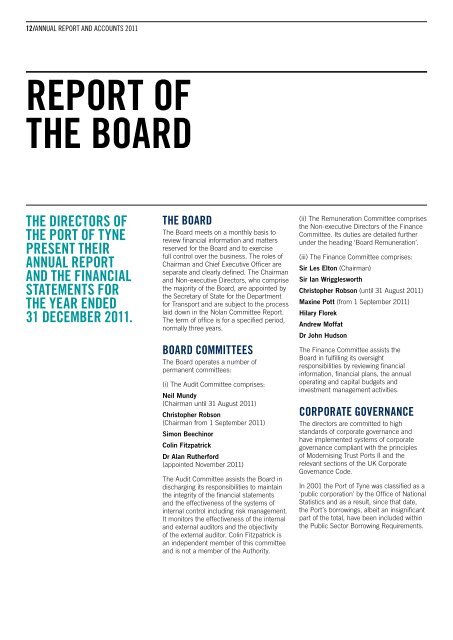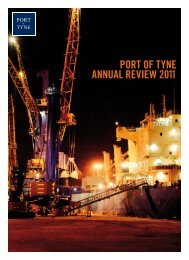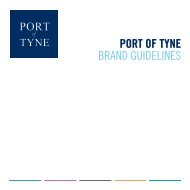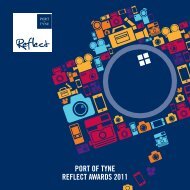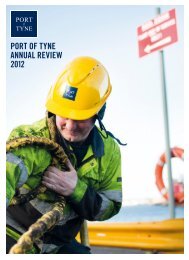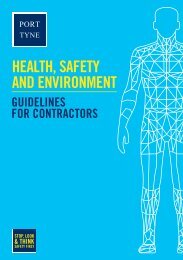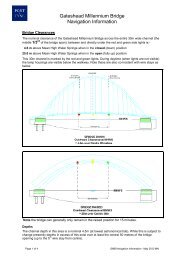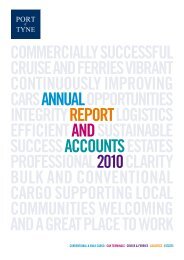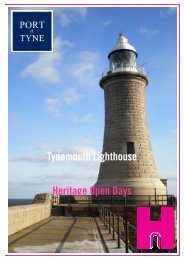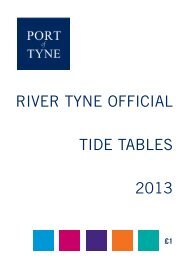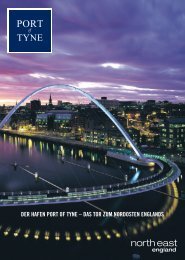PORT OF TYNE ANNUAL REPORT AND ACCOUNTS 2011
PORT OF TYNE ANNUAL REPORT AND ACCOUNTS 2011
PORT OF TYNE ANNUAL REPORT AND ACCOUNTS 2011
You also want an ePaper? Increase the reach of your titles
YUMPU automatically turns print PDFs into web optimized ePapers that Google loves.
12/<strong>ANNUAL</strong> RE<strong>PORT</strong> <strong>AND</strong> <strong>ACCOUNTS</strong> <strong>2011</strong><br />
RE<strong>PORT</strong> <strong>OF</strong> THE BOARD/13<br />
RE<strong>PORT</strong> <strong>OF</strong><br />
THE BOARD<br />
THE DIRECTORS <strong>OF</strong><br />
THE <strong>PORT</strong> <strong>OF</strong> <strong>TYNE</strong><br />
PRESENT THEIR<br />
<strong>ANNUAL</strong> RE<strong>PORT</strong><br />
<strong>AND</strong> THE FINANCIAL<br />
STATEMENTS FOR<br />
THE YEAR ENDED<br />
31 DECEMBER <strong>2011</strong>.<br />
The Board<br />
The Board meets on a monthly basis to<br />
review financial information and matters<br />
reserved for the Board and to exercise<br />
full control over the business. The roles of<br />
Chairman and Chief Executive Officer are<br />
separate and clearly defined. The Chairman<br />
and Non-executive Directors, who comprise<br />
the majority of the Board, are appointed by<br />
the Secretary of State for the Department<br />
for Transport and are subject to the process<br />
laid down in the Nolan Committee Report.<br />
The term of office is for a specified period,<br />
normally three years.<br />
Board committees<br />
The Board operates a number of<br />
permanent committees:<br />
(i) The Audit Committee comprises:<br />
Neil Mundy<br />
(Chairman until 31 August <strong>2011</strong>)<br />
Christopher Robson<br />
(Chairman from 1 September <strong>2011</strong>)<br />
Simon Beechinor<br />
Colin Fitzpatrick<br />
Dr Alan Rutherford<br />
(appointed November <strong>2011</strong>)<br />
The Audit Committee assists the Board in<br />
discharging its responsibilities to maintain<br />
the integrity of the financial statements<br />
and the effectiveness of the systems of<br />
internal control including risk management.<br />
It monitors the effectiveness of the internal<br />
and external auditors and the objectivity<br />
of the external auditor. Colin Fitzpatrick is<br />
an independent member of this committee<br />
and is not a member of the Authority.<br />
(ii) The Remuneration Committee comprises<br />
the Non-executive Directors of the Finance<br />
Committee. Its duties are detailed further<br />
under the heading ‘Board Remuneration’.<br />
(iii) The Finance Committee comprises:<br />
Sir Les Elton (Chairman)<br />
Sir Ian Wrigglesworth<br />
Christopher Robson (until 31 August <strong>2011</strong>)<br />
Maxine Pott (from 1 September <strong>2011</strong>)<br />
Hilary Florek<br />
Andrew Moffat<br />
Dr John Hudson<br />
The Finance Committee assists the<br />
Board in fulfilling its oversight<br />
responsibilities by reviewing financial<br />
information, financial plans, the annual<br />
operating and capital budgets and<br />
investment management activities.<br />
Corporate Governance<br />
The directors are committed to high<br />
standards of corporate governance and<br />
have implemented systems of corporate<br />
governance compliant with the principles<br />
of Modernising Trust Ports II and the<br />
relevant sections of the UK Corporate<br />
Governance Code.<br />
In 2001 the Port of Tyne was classified as a<br />
‘public corporation’ by the Office of National<br />
Statistics and as a result, since that date,<br />
the Port’s borrowings, albeit an insignificant<br />
part of the total, have been included within<br />
the Public Sector Borrowing Requirements.<br />
The Department for Transport issues<br />
regulatory guidance for Trust Ports and this<br />
was most recently updated in 2009 via<br />
issue of Modernising Trust Ports II which<br />
suggested best practice constitution and<br />
reporting. This guidance also introduced<br />
the concept of master plans, disclosure<br />
and stakeholder benefits. The Board has<br />
reviewed the recommendations contained<br />
therein and has put in place procedures<br />
to ensure adoption of these guidelines.<br />
In fulfilling its duties the Board has also<br />
had regard to the requirements of the Port<br />
Marine Safety Code, last updated in 2009.<br />
The Board has also carried out a formal<br />
risk review and has maintained a<br />
programme of reviews to enable the Board<br />
to monitor and manage significant risks.<br />
Internal Control and<br />
Risk Management<br />
The directors are responsible for the<br />
business’s system of internal control. Such<br />
a system provides reasonable but not<br />
absolute assurance against material loss<br />
or misstatement.<br />
Key procedures that have been established<br />
include an organisational structure with<br />
clear operating procedures, lines of<br />
responsibility and delegated authority. In<br />
particular, there are defined procedures for:<br />
– Capital investment covering appraisal<br />
and authorisation<br />
– Financial reporting within a<br />
comprehensive financial planning<br />
and accounting framework<br />
– Internal audit to monitor the system of<br />
internal control and risk management<br />
– The procurement of goods and services<br />
The directors have reviewed the<br />
effectiveness of the system of internal<br />
control for the accounting year and the<br />
period to the date of the approval of the<br />
financial statements in accordance with<br />
the principles included in the Combined<br />
Code and other relevant guidance.<br />
Principal Risks and<br />
Uncertainties<br />
Risk management system<br />
The Port operates an internal risk<br />
management system that captures<br />
material commercial, operational, financial,<br />
regulatory and people risks. Mitigating<br />
controls are designed for all material risks<br />
identified with resulting actions incorporated<br />
into business area business plans and<br />
extended to senior management personal<br />
objectives as appropriate. Material risks<br />
are formally reviewed, scored and ranked<br />
each year with monthly updates given to<br />
the Board of any changes to these risks<br />
during the year. The assessment of new<br />
risks arising is a standing item on the<br />
monthly Board agenda.<br />
Key risks and uncertainties<br />
Key risks and uncertainties identified, and<br />
constantly reviewed by the Board, are<br />
categorised as Regulatory, Commercial,<br />
Operational, Financial and People based.<br />
Regulatory risks associated with<br />
Government Energy policy and Port policy<br />
are constantly reviewed. Policy relating to<br />
energy has a material impact upon the<br />
Port, which handles significant quantities<br />
of coal and biomass on behalf of power<br />
generation customers. Further renewable<br />
energy opportunities are being pursued<br />
by the Port, including business development<br />
relating to offshore wind power generation.<br />
These opportunities will be significantly<br />
influenced by future Government policy.<br />
Competitive risks are connected with<br />
the strategies of both direct and indirect<br />
competitors. This could include the<br />
application of predatory pricing in an<br />
attempt to attract existing Port customers,<br />
and the provision of services already<br />
offered by the Port of Tyne.<br />
Despite having diverse business interests<br />
covering Conventional and Bulk, Cargo<br />
handling, Car Terminals, Cruise and Ferry,<br />
Logistics and Estates, activity levels are<br />
impacted by movements in global<br />
commodity pricing and changes in the level<br />
of national and international demand for<br />
products and services, with the latter being<br />
strongly influenced by the relative strength<br />
of sterling against other major currencies.<br />
Operational risk mitigations have been<br />
identified, through the risk management<br />
process, relating to Health & Safety,<br />
operational capacity, condition of<br />
infrastructure and handling of new<br />
cargo types and their associated<br />
environmental impact.<br />
Financial risk includes being able to access<br />
appropriate funding to allow business<br />
expansion. In 2008 a Harbour Revision<br />
Order granted the Port of Tyne unlimited<br />
borrowing powers. Currently the business<br />
has three separate facilities totalling £36.2<br />
million: a £15.7 million revolving credit<br />
facility with Barclays that runs until 2013,<br />
a £16.3 million fixed term facility also with<br />
Barclays that runs until 2019 and a £4.2<br />
million fixed term loan with Dexia that<br />
matures in 2013. Borrowings under these<br />
facilities at 31 December <strong>2011</strong> totalled<br />
£18.5 million.<br />
People are a hugely important element<br />
of the Port’s current and future success.<br />
Organisational structure, skills availability,<br />
succession planning and employee<br />
engagement are also subject to constant<br />
review through the Port’s risk<br />
management process.<br />
Pension Schemes<br />
The Port operates two defined benefit<br />
pension schemes and whilst these schemes<br />
were both closed to new members in 2001,<br />
risks remain regarding the performance<br />
of the associated investment portfolios<br />
relative to the cost of providing ongoing<br />
pension benefits. Further details can be<br />
found in note 21 to the financial statements.<br />
Furthermore, in respect of industry wide<br />
pension schemes, the Pilots National<br />
Pension Fund (PNPF) and the Former<br />
Registered Dock Workers Pension Scheme<br />
(FRDWPS), the Port has no control over or<br />
clear forward visibility on the quantification<br />
of contributions. There is a risk that these<br />
future contributions may be substantial<br />
costs for the Port.


